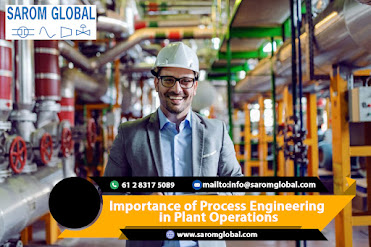Importance of Process Engineering in Plant Operations
We all know the complexity of operating an industrial plant. But not everyone comprehend the fact that process engineering highly critical for such intricate operations. Before we dive into understanding the importance of process engineering in plant operations, its is ideal to know what is process engineering because without knowing about process engineering you won’t be able to ideally accept its importance. So read on.
What is Process Engineering?
Process engineering is a complex multidisciplinary specialisation that involves elements of economics and mathematical engineering, primarily based on chemical engineering it draws from environmental and mechnical enginnering. Throughout the process development cycle, process engineering makes use of systematic computer-aided tools and experimental procedures. The whole responsibility for the design, execution, control, and optimisation of industrial processes falls on this intricate and constantly evolving field.
Why is Process Engineering Important?
As previously stated process engineering is not just a single process but a mix of study that focuses on the conception of processes, particularly continuous processes for the chemical, petrochemical, energy, utility, oil, gas, food, and pharmaceutical sectors.
Process engineering entails developing an understanding of the significant underlying science pertinent to the problem, starting from a specified problem statement (such as a customer need or a collection of experimental results). Below are some aspects within this area that justifies and highlights the importance of process engineering in plant operations.
Front end engineering design (FEED)
The process of planning and developing technical knowledge used to define the scope, approach, and cost of building a piece of process equipment is known as front end engineering design, sometimes referred to as front end loading (FEL) or pre-project planning.
Various investigations are conducted at this time to identify technical problems and make rough investment cost estimates prior to the start of the EPC (Engineering, Procurement and Construction).
To prevent substantial modifications during the subsequent process equipment design phases, it is essential to incorporate the project's unique needs within the FEED package.
Due to the extensive project specification extraction, Front-End Engineering takes longer than standard quotations. Additionally, FEED often entails carefully preparing a number of documents. This includes:
Project Organization Chart
Project Scope
HAZOP, safety and ergonomic studies
2D & 3D preliminary models
Equipment layout and installation plan
Engineering design
Package development
Major equipment list
Automation strategy
Process Flow Diagrams (PFD)
Piping and Instrumentation Diagrams (P&ID)
Project timeline
Fixed-bid quote
Process system design
The next stage is to immediately begin planning the processing system after the FEED is finished. The design stage sees the completion of the design work that was begun in the front-end engineering design stage.
The process system design step is essential because it requires experienced process engineering consultants and engineers to thoroughly explore the design work and to create solutions that get around production bottlenecks for higher productivity and greater revenues.
At this stage, the process engineering consultants deliver the final P&IDs and PFDs to the process equipment designers. Designers then render 2D and 3D models of the apparatus to simulate how it will fit in its ultimate position using this engineering documentation. This process involves developing:
Process flow diagrams (PFD’s)
Piping & instrumentation diagrams (P&ID’s)
Process simulation
2D & 3D modeling/simulation
Mechanical & structural design
Skid design
FEA analysis
Equipment layout
Piping design
Lift & installation planning
Automaton and controls engineering
Future starting and operation will be easier with well-designed process control and automation technologies. Automation engineers choose input and output devices at this stage based on the goals of the control system. At this stage, engineers also taken into account the choice of equipment that adheres to industry standards. This includes:
Automation Design
Control Panel Fabrication
Control System Development
Controls Integration Services
Electrical design
MES & SCADA Solutions
Safety Engineering
Process Programming (including Logic, PLC, DCS and/or HMI Programming)
Process simulation
Process instrumentation
Process equipment fabrication and assembly
All process engineering—mechanical, electrical, and control—has been completed, and the equipment for the process is prepared for installation at this point.
At this stage, a suitable fabricator or manufacturer, as well as installation workshops, are located. Finding a workshop that can offer the ideal setting and procedures that adhere to industry norms is essential when choosing the best workshop.
Finding the correct workshop will help with project timeliness, quality, cost savings, and safety issues. The process equipment fabrication includes:
Sheet metal fabrication
Skid frame fabrication
Mechanical assembly
Pressure vessel fabrication
Structural fabrication
Electrical panels
Electrical wiring per NFPA
Instrumentation
Insulation
Pipe fitting
Piping
Tooling
Tubing
Welding
Testing and Commision
Testing and commissioning are the last steps in the equipment engineering process. Testing and commissioning mark the change from fabrication and assembly to operation.
FAT Testing
Testing, often known as a "factory Acceptance Test (FAT)," is a process that assesses the equipment both during and following assembly by ensuring that it is constructed and working in compliance with design standards.
FAT procedures make sure that the process's elements and controls are operating in accordance with the equipment's functioning. Similar to this, FAT processes are frequently carried out to evaluate any abnormalities and non-conformities and create a strategy for how they are to be addressed.
Process Plant Commissioning
Cleaning, flushing, verifications, leak tests, performance evaluation, and functional tests are among the commissioning tasks for processing plants that are important for getting newly constructed plants or facilities into regular operation.
The diligence put forth in the earlier stages pays off at this point. During FEED, careful design of the machinery, controls, and building materials will enable a smooth beginning.
Since commissioning is the final significant step before operation, there is a chance that it will happen under intense time constraints or that some delayed activities will continue beyond the plant's initial operation.
Further adding to the importance of process engineering for plant operations, process engineering involves engineering design consideration. It plays a vital role while developing process equipment and takes into account the type of environment in which the equipment will operate. Process engineering consultants design and commision the process equipment with extreme care to withstand corrosion and other damage processes that are expected to happen in the given settings. To ensure the equipment's continuous performance and safety over its lifetime, adequate inspection and maintenance programmes are also crucial.
Based on the information furnished above, we believe you now fully understand why process engineering is highly important for any type of multidisciplinary industrial or plant operation.
SAROM GLOBAL is your go-to process engineering consultant if you are seeking an expert to deal with your industrial processes and operations. With years of industry experience in dealing with the energy, utility, oil, gas, manufacturing, and chemical industries, SAROM GLOBAL is well capable of dealing with all types of industrial process challenges.




Comments
Post a Comment